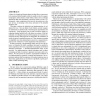597 search results - page 84 / 120 » Formal Techniques for Java-Like Programs |
106
click to vote
CAV
2010
Springer
15 years 6 months ago
2010
Springer
Well-defined memory consistency models are necessary for writing correct parallel software. Developing and understanding formal specifications of hardware memory models is a chal...
200
click to vote
ENTCS
2002
15 years 2 months ago
2002
The paper presents approaches to the validation of optimizing compilers. The emphasis is on aggressive and architecture-targeted optimizations which try to obtain the highest perf...
141
Voted
OOPSLA
2005
Springer
15 years 7 months ago
2005
Springer
is a simple and elegant abstraction that allows concurrency to be expressed often through a relatively small rewrite of a sequential program. In the absence of side-effects, futur...
129
click to vote
ICALP
1994
Springer
15 years 6 months ago
1994
Springer
When provingthe correctness of algorithmsin distributed systems, one generally considers safety conditions and liveness conditions. The Input Output I O automaton model and its ti...
103
click to vote
LPNMR
1990
Springer
15 years 6 months ago
1990
Springer
We present a general theory for the use of negative premises in the rules of Transition System Specifications (TSSs). We formulate a criterion that should be satisfied by a TSS in ...


